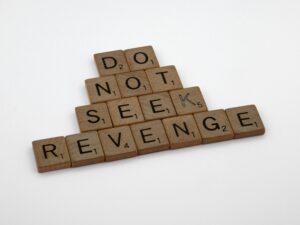News
Wall Street Journal Writer Suggests that Revenge Can Be Addictive and There Is One Best Cure for It

Photo by Brett Jordan, Pexels.com
On June 5, in the Wall Street Journal, James Kimmel Jr. reports on how he was bullied as a child, which led to him becoming an “aggressive attorney” as an adult. He realized that whenever he sought revenge or even imagined getting revenge, he felt better. As he researched the neuroscience of revenge, he discovered that the brain releases dopamine, a neurotransmitter associated with feelings of pleasure and reward. This feel-good sensation kept him seeking or fantasizing about revenge until he decided to stop the cycle of revenge, dopamine, feel-good, and more revenge to release the dopamine. In his quest to break the cycle, he discovered that forgiveness is a means to halt the cycle of revenge, which in turn eliminates the need for more dopamine, thereby reinforcing the need for revenge. Forgiveness was the cure for him.
More on this story can be found here: https://www.newser.com/story/369842/revenge-is-like-an-addiction.html.
‘The Forgiving Life’ featured on Elevate Society website
 There is a website entitled Elevate Society run by Tal Gur as the Chief Editor. On July 24, 2025 they published a beautiful description of our book, The Forgiving Life. Their description of the book shows that they definitely “get it” regarding our message of forgiveness. Their review can be found here: https://elevatesociety.com/the-forgiving-life-summary-review/
There is a website entitled Elevate Society run by Tal Gur as the Chief Editor. On July 24, 2025 they published a beautiful description of our book, The Forgiving Life. Their description of the book shows that they definitely “get it” regarding our message of forgiveness. Their review can be found here: https://elevatesociety.com/the-forgiving-life-summary-review/
Is it true that people “Forgive and Forget”?

Image by Meo, Pexels.com
A recent set of four studies examined the extent to which people actually forget the unjust situation once they have forgiven. The reference to that work is:
Fernández-Miranda, G., Stanley, M., Murray, S., Faul, L., & De Brigard, F. (2025). The emotional impact of forgiveness on autobiographical memories of past wrongdoings. Journal of Experimental Psychology: General. Advance online publication. https://doi.org/10.1037/xge0001787
The authors made the distinction between the possibility that the memory of the event fades (what they called “episodic fading”) and what they called “emotional fading” in which the strong and negative emotions are diminished upon forgiving.
The authors, in their abstract, concluded this:
“While the episodic fading account predicts that forgiveness is associated with less vivid and detailed memories of being wronged, the emotional fading account predicts that forgiveness need not be associated with diminished episodic characteristics. Across four studies (N = 1,479, after exclusions), we found consistent support for the emotional fading account but not for the episodic fading account.”
In other words, people do not literally forget what happened once they forgive. The memory can pass through the mind and heart without the heightened negative emotions welling up.
“Forgive and forget” may need to be rephrased as “forgiving and remembering in new ways.”
‘I Forgive You’: After Decades Behind Bars for His Wife’s Murder, Leo Schofield Finds Healing in a Call with the Man Who Confessed

Image by Tyler Lastovich, Pexels.com
On April 11, 2025, The News Review (https://www.nrtoday.com/he-served-36-years-for-his-wife-s-murder-and-then-forgave-the-man-who/article_473a7a92-17a1-4b83-95e0-e353e4bcb615.html) in Oregon reported on a man, Leo Schofield, who allegedly killed his wife. He was released from a correctional institution after serving 36 years. He maintained his innocence throughout the imprisonment.
Upon being released to regular society, Mr. Schofield took about one year, and then he had a telephone conversation with the man, Jeremy Scott, who proclaimed on several occasions that he was the one who murdered Mr. Schofield’s wife. It was at that time that Mr. Schofield forgave the other man, reporting that forgiveness is a process of “being freed from the effect” of the hurt he carried inside.
Mr. Schofield seems to have gone through the process of what we call the Work Phase of forgiveness, in which he started to think about Mr. Scott in new ways, not to condone what he did, but to better understand him. As reported in The News Review, Mr. Schofield said this, “‘I developed a certain respect and somewhat of an affinity for the guy,’ he said. ‘I wanted to tell him that I genuinely forgive him and, more important, I wanted him to know that there are people that care about him and want to see him do right.’”
Dr. Robert Enright and IFI colleagues featured in recent edition of APA Journal

Image by Pixabay, Pexels.com
Robert Enright was the special issue editor for the first issue of 2025 in the American Psychological Association’s Journal of Theoretical and Philosophical Psychology. His colleagues and he published the centerpiece article on what they call the “definitional drift” in how researchers understand the moral construct of forgiveness. There are at least eight different definitions of forgiveness in the published literature, most of which are philosophically incorrect. The central article was followed by commentaries from three philosophers and three psychologists and a final comment by Robert Enright, Jichan Kim, and Jacqueline Song. The centerpiece and final article of the special issue are these:
Song, J., Enright, R.D., & Kim, J. (2025). Definitional drift within the science of forgiveness: The dangers of avoiding philosophical analyses. Journal of Theoretical and Philosophical Psychology, 45(1), 3-24. Note: This is the centerpiece article for a special issue on the definition of forgiveness within psychology. doi: https://doi.org/10.1037/teo0000278
Enright, R.D., Kim, J., & Song, J. (2025). Our hope that definitional drift in forgiveness will cease from drifting: Our comments on the six commentaries. Journal of Theoretical and Philosophical Psychology, 45(1), 65-71. doi: https://doi.org/10.1037/teo0000306



